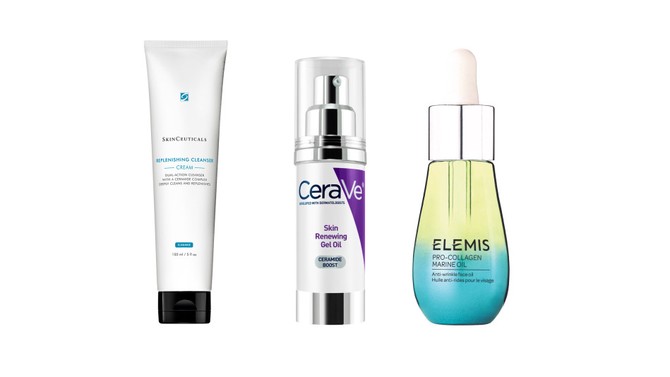Is Your Skin Dry or Dehydrated? Here's How to Tell
By Holly Carter
The Naked Truth
As the weather gets colder, you may be getting itchier, flakier, ashier—and crankier. To find the right treatment plan, you need to answer one question: Is your skin truly dry or just dehydrated? Here’s how to find out, along with dermatologists' targeted tips for soothing and smoothing.
Really look at and touch your skin, and pay attention to any changes over time to accurately assess what it needs. If it routinely feels coarse, you’re probably dry. If it’s typically normal but seems to be going through a less-than-silky stage, dehydration is most likely the issue at hand (or elbow, or knee).
Your skin is dry if...it consistently feels rough and itchy, looks blotchy, or is flaky. The top layer of your skin, the epidermis, is itself made up of layers. You can think of the outermost one, called the stratum corneum (derms also refer to it as the “barrier”), as a brick wall. “The bricks are skin cells, and the mortar is made up of natural oils that hold it all together,” says Joshua Zeichner, MD, director of cosmetic and clinical research in dermatology at Mount Sinai Hospital in New York City. Dry skin doesn’t produce enough of this mortar, leaving the stratum corneum permeable and vulnerable to water loss.
Here's The Plan
Your strategy is to protect what precious oil your skin actually does produce and give it an assist with nourishing ingredients that seal in moisture.
Dry Skin: For Your Face
Cleanse gently. You don’t want to strip away that barrier-reinforcing oil. So choose a creamy formula with no harsh foaming detergents like sodium lauryl sulfate or sodium laureth sulfate (1). Bonus points if it contains skin-friendly fats called ceramides (more on those below).
Turn down the heat. A toasty pick-me-up feels great on a chilly morning, but the water you wash your face with should be lukewarm. “Think of the temperature of a heated pool,” says Zeichner. Anything hotter can strip away essential oils, or mortar, from the outer layer of skin.
Seek out ceramides. These waxy fats are naturally produced by skin as part of that mortar. Your complexion needs more of them—and most creams and serums are infused with lab-made versions that work like the real thing, says cosmetic chemist Perry Romanowski. Slather on one of them (2) twice daily (nighttime use is particularly important since that’s when the skin’s hydration level is naturally low, says Zeichner).
Avoid irritation. Potent antiaging agents like retinol and alpha hydroxy acids can aggravate your already-compromised skin. To increase your tolerance of these ingredients, use them every other day, dilute your products with moisturizer before applying, or prime your skin with a cream first. You could also switch to a product with gentler wrinkle and spot fighters, like peptides, growth factors, or marine extracts (3).
Skin Savers
1. SkinCeuticals Replenishing Cleanser ($34; SkinCeuticals.com)
2. CeraVe Skin Renewing Gel Oil ($25; drugstores)
3. Elemis Pro-Collagen Marine Oil ($79; Elemis.com)
Really look at and touch your skin, and pay attention to any changes over time to accurately assess what it needs. If it routinely feels coarse, you’re probably dry. If it’s typically normal but seems to be going through a less-than-silky stage, dehydration is most likely the issue at hand (or elbow, or knee).
Your skin is dry if...it consistently feels rough and itchy, looks blotchy, or is flaky. The top layer of your skin, the epidermis, is itself made up of layers. You can think of the outermost one, called the stratum corneum (derms also refer to it as the “barrier”), as a brick wall. “The bricks are skin cells, and the mortar is made up of natural oils that hold it all together,” says Joshua Zeichner, MD, director of cosmetic and clinical research in dermatology at Mount Sinai Hospital in New York City. Dry skin doesn’t produce enough of this mortar, leaving the stratum corneum permeable and vulnerable to water loss.
Here's The Plan
Your strategy is to protect what precious oil your skin actually does produce and give it an assist with nourishing ingredients that seal in moisture.
Dry Skin: For Your Face
Skin Savers
1. SkinCeuticals Replenishing Cleanser ($34; SkinCeuticals.com)
2. CeraVe Skin Renewing Gel Oil ($25; drugstores)
3. Elemis Pro-Collagen Marine Oil ($79; Elemis.com)
From the November 2017 issue of O, The Oprah Magazine


